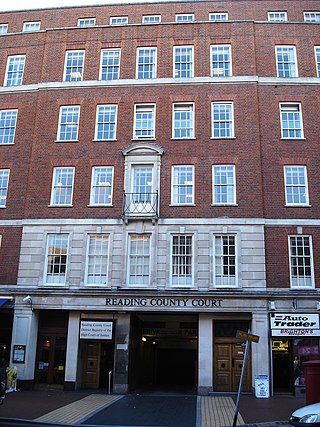
An estate agent is a person or business that arranges the selling, renting, or management of properties and other buildings. An agent that specialises in renting is often called a letting or management agent. Estate agents are mainly engaged in the marketing of property available for sale, and a solicitor or licensed conveyancer is used to prepare the legal documents. In Scotland, however, many solicitors also act as estate agents, a practice that is rare in England and Wales.

A landlord is the owner of a house, apartment, condominium, land, or real estate which is rented or leased to an individual or business, who is called a tenant. When a juristic person is in this position, the term landlord is used. Other terms include lessor and owner. The term landlady may be used for the female owners. The manager of a pub in the United Kingdom, strictly speaking a licensed victualler, is referred to as the landlord/landlady. In political economy it refers to the owner of natural resources alone from which an economic rent, a form of passive income, is the income received.

A lease is a contractual arrangement calling for the user to pay the owner for the use of an asset. Property, buildings and vehicles are common assets that are leased. Industrial or business equipment are also leased. Basically a lease agreement is a contract between two parties: the lessor and the lessee. The lessor is the legal owner of the asset, while the lessee obtains the right to use the asset in return for regular rental payments. The lessee also agrees to abide by various conditions regarding their use of the property or equipment. For example, a person leasing a car may agree to the condition that the car will only be used for personal use.
Property management is the operation, control, maintenance, and oversight of real estate and physical property. This can include residential, commercial, and land real estate. Management indicates the need for real estate to be cared for and monitored, with accountability for and attention to its useful life and condition. This is much akin to the role of management in any business.
Rent control in Ontario refers to a system of rent regulation in Ontario, Canada which limits the amount by which the rent paid by tenants for rental accommodation can increase. It applies to any unit that was first occupied for residential purposes before November 15, 2018.

A house in multiple occupation (HMO), or a house of multiple occupancy, is a British English term which refers to residential properties where ‘common areas’ exist and are shared by more than one household.
The assured shorthold tenancy (AST) is the default legal category of residential tenancy in England and Wales. It is a form of assured tenancy with limited security of tenure, which was introduced by the Housing Act 1988 and saw an important default provision and a widening of its definition made by the Housing Act 1996. Since 28 February 1997 in respect of accommodation to new tenants who are new to their landlords, the assured shorthold tenancy has become the most common form of arrangement that involves a private residential landlord. The equivalent in Scotland is short assured tenancy.
Landlord harassment is the willing creation, by a landlord or their agents, of conditions that are uncomfortable for one or more tenants in order to induce willing abandonment of a rental contract. This is illegal in many jurisdictions, either under general harassment laws or specific protections, as well as under the terms of rental contracts or tenancy agreements.
Under the provisions of the United Kingdom Housing Act 2004 every landlord or letting agent that takes a deposit for an assured shorthold tenancy in England and Wales must protect the deposit under an authorised tenancy deposit scheme. The regulations came into effect on 6 April 2007, and were amended by the Localism Act 2011 and the Deregulation Act 2015. Most recently the Tenant Fees Act 2019 provided further protections for tenants.

A letting agent is a facilitator through which an agreement is made between a landlord and tenant for the rental of a residential property. This is commonly used in countries using British English, including countries of the Commonwealth. In the UK, Australia, and New Zealand, the agreement between landlord and tenant is normally formalised by the signing of a tenancy agreement. A letting agency will normally charge a commission for their services, usually a percentage of the annual rent.
A security deposit is a sum of money held in trust.

An assured tenancy is a legal category of residential tenancy to an individual in English land law. Statute affords a tenant under an assured tenancy a degree of security of tenure. A tenant under an assured tenancy may not be evicted without a reasonable ground in the Housing Act 1988 and, where periodic changes in rent are potentially subject to a challenge before a rent assessment committee.

The Landlord and Tenant Act 1985 is a UK Act of Parliament on English land law. It sets minimum standards in tenants' rights against their landlords.
The history of rent control in England and Wales is a part of English land law concerning the development of rent regulation in England and Wales. Controlling the prices that landlords could make their tenants pay formed the main element of rent regulation, and was in place from 1915 until its abolition by the Housing Act 1988.
In England and Wales, a section 21 notice, also known as a section 21 notice of possession or a section 21 eviction, is the notice which a landlord must give to their tenant to begin the process to take possession of a property let on an assured shorthold tenancy without providing a reason for wishing to take possession. The expiry of a section 21 notice does not bring a tenancy to its end. The tenancy would only be ended by a landlord obtaining an order for possession from a court, and then having that order executed by a County Court bailiff or High Court enforcement officer. Such an order for possession may not be made to take effect earlier than six months from the beginning of the first tenancy unless the tenancy is a demoted assured shorthold tenancy. If the court is satisfied that a landlord is entitled to possession, it must make an order for possession, for a date no later than 14 days after the making of the order unless exceptional hardship would be caused to the tenant in which case possession may be postponed to a date no later than six weeks after the making of the order. The court has no power to grant any adjournment or stay of execution from enforcement unless the tenant has a disability discrimination, public law or human rights defence, or the case is pending an appeal.
Rent control in Scotland is based upon the statutory codes relating to private sector residential tenancies. Although not strictly within the private sector, tenancies granted by housing associations, etc., are dealt with as far as is appropriate in this context. Controlling prices, along with security of tenure and oversight by an independent regulator or the courts, is a part of rent regulation.
"'Tenant screening'" is used primarily by residential landlords and property managers to evaluate prospective tenants. The purpose is to assess the likelihood the tenant will fulfill the terms of the lease or rental agreement and will also take great care of the rental property in question. The process culminates in a decision as to whether to approve the applicant, approve the applicant conditionally, or deny tenancy.
A short assured tenancy is a type of tenancy in Scotland that was introduced by the Housing (Scotland) Act 1988. A short assured tenancy gives landlords some protection and freedom of action when letting their properties. Short assured tenancies have become the norm within the residential letting industry in Scotland. The equivalent legislation in England and Wales is assured shorthold tenancy. Following the enactment of the Private Housing (Tenancies) (Scotland) Act 2016, it is no longer possible to create a short assured tenancy, instead a private residential tenancy must be entered into; with greater protections for the tenant such as security of tenure.

The Housing Act 1988 is an Act of Parliament in the United Kingdom. It governs the law between landlords and tenants. The Act introduced the concepts of assured tenancy and assured shorthold tenancy. It also facilitated the transfer of council housing to not-for-profit housing associations, which was then carried out partly through the system of Large Scale Voluntary Transfer.
Zero Deposit is a UK based deposit-free renting platform with its headquarters in Hertfordshire, UK. It provides an insurance backed guarantee underwritten by Equitable Rental Insurance Limited is and regulated by the Financial Conduct Authority (FCA), which allows tenants to pay less upfront when renting.







